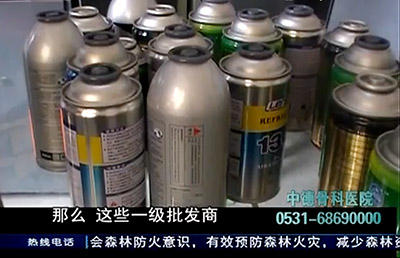Fake Chinese R134a is ozone-depleting R12
- PostedPublished 19 May 2014

COUNTERFEIT refrigerants appear to be flooding the huge Chinese market, with the worrying trend of ozone-depleting R12 often masquerading as R134a.
The news comes soon after Chinese authorities prosecuted two companies for producing fake Honeywell refrigerants and DuPont reached a settlement with a company in the Philippines for supplying fake Chinese-sourced refrigerants found to be 90 per cent R12.
According to Cooling Post, Chinese television reports on the Shandong public channel showed aerosol cans of cheap refrigerant misleadingly labelled R134a being sold in car parts and accessories stores.
Reporters purchased 12 cans of R134a labelled refrigerant from stores in Shangdong province capital city Jinan, in eastern China, then had them independently tested by the Shangdong Analysis and Test Centre at the Shangdong Academy of Sciences.
Only two of the 12 containers tested contained R134a as stated, with one of those below Chinese refrigerant purity standards.
It is estimated that as much as 80 per cent of similar R134a labelled cans on the Chinese market contain R12, which in addition to ozone depletion, can cause leaky seals and other damage to systems designed for R134a.
This compounds the environmental impact of the R12 by causing more leakage of R134a, a powerful greenhouse gas, into the atmosphere.
It is not clear where the R12 is coming from, as since January 1 2010 China officially complied with the Montreal Protocol by ending CFC production for uses other than Metered Dose Inhalers that treat respiratory problems such as asthma.
China has also initiated a program to phase out inhalers containing CFC propellants by 2016.
A scientific report revealing mysterious new synthetic CFCs and HCFCs in the atmosphere – thought to have been emitted relatively recently in contravention of the Montreal Protocol – could be linked to counterfeit refrigerants.
In February, Changzhi Co. and Yingpeng Co were ordered by Shanghai court to pay $US52,000 in damages and make a public apology to Honeywell for faking its Genetron 401A and 407C products.
Changzhi has previous convictions for trademark counterfeiting and its principal was sentenced to three years’ imprisonment.
It is the result of the latest in 13 raids conducted by Honeywell in China since 2007.
“Counterfeit refrigerants can be flammable and can pose a serious danger to contractors, consumers, and refrigeration equipment,” said Honeywell Fluorine Products managing director for in Europe, Middle East, Africa and India Paul Sanders.
“Honeywell continues to work closely with local law enforcement and other authorities to actively pursue and help prosecute counterfeiters of our Genetron refrigerants.”
The DuPont case in the Phillipines against company TA Fresco dates back to 2012, when undercover DuPont officials purchased refrigerant cylinders falsely labelled as Dupont Suva 134a.
TA Fresco was supplying the refrigerants to a service provider in the shipping industry when DuPont launched its investigation.
The fake cylinders stood out as featuring spelling mistakes and incorrect markings, while their contents were found to consist of more than 90 per cent R12.
US Homeland Security officials assisted local police to raid TA Fresco’s warehouse, seizing 511 counterfeit refrigerant cylinders.
In the third quarter of last year DuPont negotiated settlement of the case, forcing TA Fresco to disclose the name of its supplier in China, which is now subject to a separate legal investigation.
TA Fresco was also made to publish a formal public apology in a national Philippines newspaper, pay for the destruction of the fake refrigerant and pay compensation for illegal refrigerant distribution.
DuPont Refrigerants global brand protection manager Elizabeth Sassano said that in addition to the “blatant counterfeit situation,” the case uncovered a violation of the Montreal Protocol due to the illegal smuggling of ozone-depleting substances.
“DuPont takes protection of its brands and safety and compliance with environmental international treaties very seriously,” added Sassano.
“We will continue to pursue and prosecute such cases to the fullest extent of the law.”
- CategoriesIn Latest News

